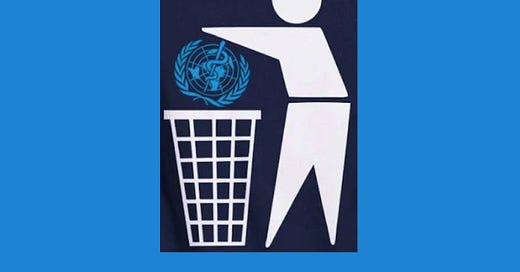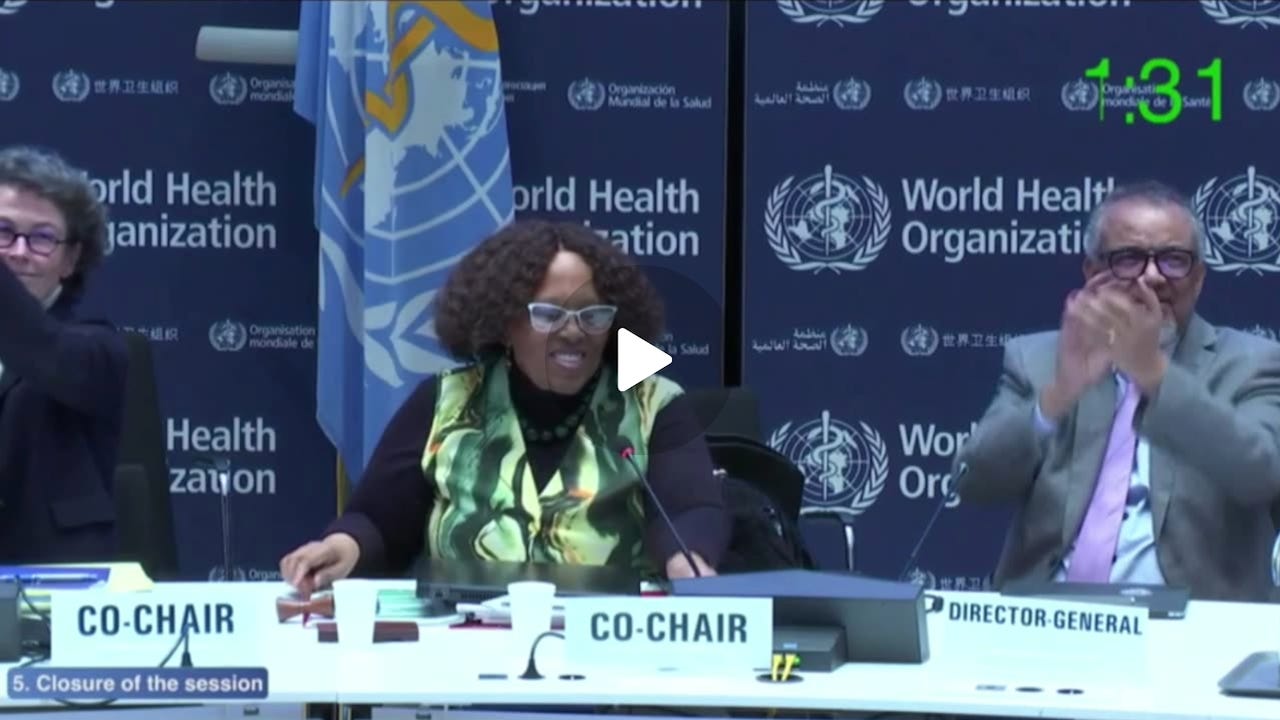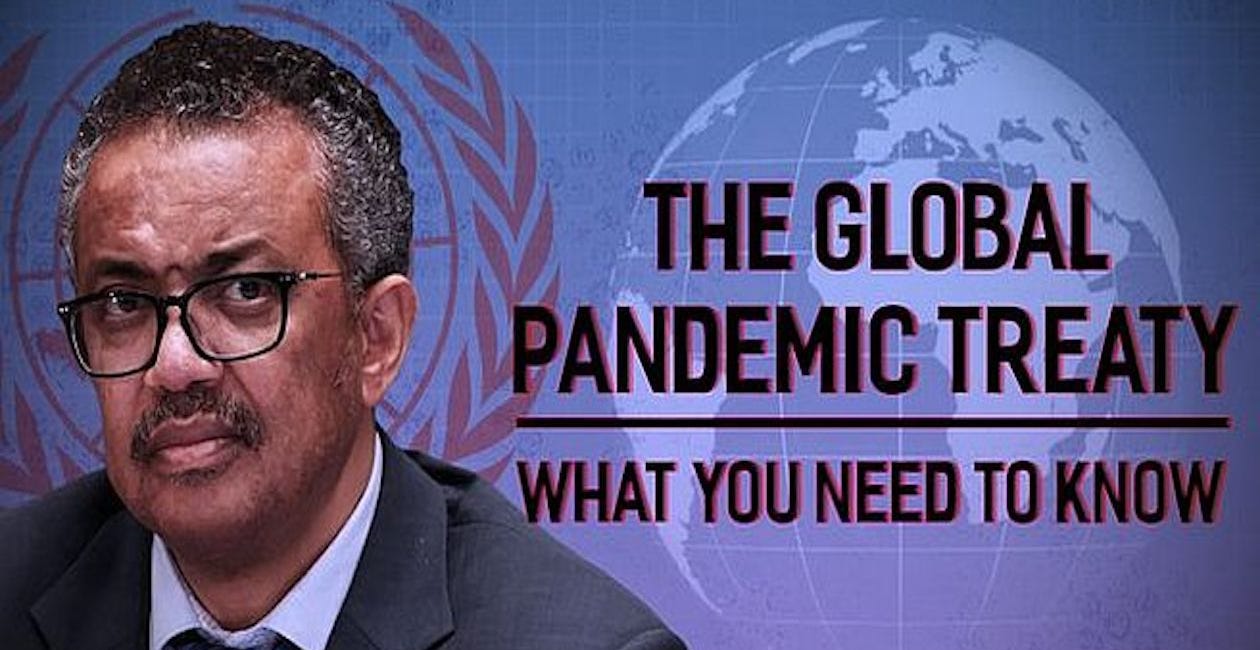The Negotiations for the Pandemic Agreement Will Continue in 2025
The "fat lady sang," but the negotiations are still not over (watch the video).
The video below is an excerpt from the final session of the 12th meeting of the Intergovernmental Negotiating Body:
Watch all the videos:
SOURCE: https://apps.who.int/gb/inb/e/e_inb-12-resumed-session.html
SUMMARY:
In over 3 years of negotiations, no one has stated, and no one will state this obvious fact: The 194 member nations are still negotiating over access to genetic sequences of “pathogens with pandemic potential” in order to profit from the manufacture of more “pandemic related products” (drugs and jabs) that have harmed and killed millions of people across the world. This insanity must stop!
Despite their ongoing claims of transparency and inclusiveness, the INB has still FAILED to provide an updated official version of the proposed “Pandemic Agreement” since May 27, 2024.
It has been claimed that agreement has been reached on Articles 9 (Research and Development) and Article 20 (Sustainable Financing).
There are still substantial disagreement on Articles 4, 11, 12, 13 and 13bis, among others.
U.S. Ambassador Pamela Hamamoto will no longer be involved in the negotiations.
Negotiations will continue in February and April, 2025.
“As the INB Turns”
It really has been quite a soap opera.
Please review these excerpts from recent articles:
No Pandemic Agreement This Year – And Doubt About Feasibility of May 2025 Deadline
There will be no pandemic agreement by year-end and, with only 10 days of formal talks set aside in 2025, some parties doubt whether an agreement can be reached by the May 2025 deadline.
The week-long extended 12th meeting of the Intergovernmental Negotiating Body (INB) made progress, particularly on research and development (Article 9) and financing (Article 20).
Noting that the nature of multilateral negotiations means finding a “landing zone” that is acceptable to everyone, France’s Amprou said sharply: “I don’t agree when you say that nobody gains anything. I invite everyone – delegations, stakeholders – to look at what we have already achieved. We have achieved a lot.”
Amprou’s response came after Medicines Law and Policy commented that while there is some new “green text”, indicating agreement on the draft agreement, “it’s important to remember that the pandemic agreement is not a colouring book”.
The European think-tank continued: “Substantive provisions on very difficult issues such as equity and access, transfer of technology, intellectual property and [pathogen] access and benefit-sharing remain largely absent, or are, at best, weak.”
Third World Network (TWN) followed, saying: “Every time we hear a new text is green, we are looking to figure out what has been compromised, especially in terms of equity.
TWN added that the agreement lacks “a baseline of legal rights and obligations”, and “protects the interest of business, not people’s rights”.
Oxfam presented a list of questions and objections on behalf of 26 stakeholders including that member states appeared to be under “extreme pressure” to defer agreement on a pathogen access and benefit-sharing (PABS) scheme to an annex, the contents of which would be decided on after the pandemic agreement had been signed.
Crux of the stalemate
The stalemate centres on differences between the European Union (EU) and the Africa Group.
The EU wants an annex linked to Article 4 (pandemic prevention) that outlines countries’ responsibilities to prevent pandemics. The Africa Group is reluctant to agree to costly responsibilities and it wants an annex related to the operationalising of a system for pathogen access and benefit-sharing (PABS) in exchange.
What the Africa Group wants from PABS is preferential access to any pandemic-related products that are developed from them sharing information about pathogens that could cause pandemics.
This is anathema to the pharmaceutical industry, largely represented by the EU and the US.
“These two areas are the make-or-break articles of the negotiations. If we can reach agreement on these, we will make the deal,” co-chair Precious Matsoso noted in an address to scientists recently.
The elephant in the room is the Donald Trump presidency, largely expected to take an axe to what Team Trump terms “globalism” – virtually anything that puts global good before national interest.
Delegates paid tribute to US Ambassador Pamela Hamamoto for her positive contribution to the pandemic agreement, as that was her last INB meeting.
Further INB meetings are scheduled for February and April, with a completed agreement supposed to be ready to be voted on at the World Health Assembly in May.
WHO: INB Bureau Pressures Global South to align with G7's One Health and Prevention Agenda
The Bureau of the Intergovernmental Negotiating Body (INB) tasked with negotiating the WHO Pandemic Agreement has aligned itself with the demands of developed countries, exerting significant pressure on developing countries to compromise, especially on the European Union’s demand for an Annex to the agreement to address a One Health approach to pandemic prevention.
The WHO Secretariat is also understood to be pressuring developing countries not to pursue their proposals in the run-up to negotiations on Article 12 on the Pathogen Access and Benefit Sharing (PABS) system.
Many developing countries consider the PABS system to be the core of the pandemic agreement for delivering some equity during health emergencies, in an instrument that is widely known to be lacking in meaningful deliverables.
In the ongoing resumed 12th session of the INB taking place in Geneva from 2 to 6 December a particular target of the Bureau’s aggressive lobbying has been the Africa Group, which has remained steadfast in its call for meaningful outcomes.
A diplomatic source participating in the negotiation informed Third World Network “that the Bureau’s only focus is on adopting some text as a Pandemic Agreement at the earliest and nothing else matters to them, not even meaningful equitable outcomes”.
INB Bureau tells Africa Group to give in to EU’s demand for an Annex
On Tuesday, 3 December, the Bureau disrupted the INB’s adopted programme of work to directly speak with the Africa Group. In a meeting that lasted about 2 hours, the Bureau expressed its unhappiness with the Africa Group’s textual proposals on Article 4 on pandemic prevention and surveillance, which was also supported by several other developing countries.
The EU has been relentless in its call for a legally binding Annex to the WHO Pandemic Agreement that will flesh out measures for pandemic prevention especially through a multisectoral surveillance lens (One Health approach) for implementing Article 4.
The EU backed by its Group of 7 (G7- Canada, France, Germany, Italy, Japan, the United Kingdom and the United States.) allies have indicated their desire for the proposed Annex to reflect concrete measures under each of the above headings with particular emphasis on obligations to implement One Health surveillance. However, the EU has persistently refused to provide any indication of possible measures they may be considering for inclusion in the proposed legally binding Annex.
Developing countries have serious concerns that the Pandemic Agreement which is supposed to deliver outcomes to address inequities experienced during health emergencies, is being used by the EU to impose surveillance and other obligations under the guise of pandemic prevention.
These obligations, developing countries fear, will come with significant trade, economic, security and national security consequences including impinging on national sovereignty.
On numerous occasions developing countries including the Africa Group explained to the EU and its G7 friends that there was no clarity on the contents of the proposed legally binding Annex, stressing that they cannot be expected to hand a “blank cheque” for G7 countries to impose legal obligations, especially front-loaded on surveillance measures.
To move the matter forward, some developing countries even welcomed the EU and its allies placing substantive or specific measures into the text of Article 4 within the current INB process to realize the objective of pandemic prevention, rather than wait for agreement on an Annex.
However, this was not acceptable to the EU.
The Bureau then weighed in, claiming that opposition to the EU's demand for an Annex is failing the negotiations, shifting the blame to developing countries, for not compromising, according to delegates participating in the negotiations.
The INB Bureau discontinued the INB proceedings to focus its attention directly on the Africa Group. In an informal meeting that lasted about 2 hours, the Bureau confronted the Africa Group on its position, presumably on the assumption that if the Africa Group changes its position, other developing countries can be forced to compromise.
However, the Africa Group stood firm and pushed back, diplomatic sources say. They expressed immense frustration with the Bureau, their tactics and the INB process generally, emphasizing that the Africa Group had already shown extensive flexibility thus far, while the G7 had barely moved on any of its positions across the text of the Pandemic Agreement. The Group requested the Bureau to instead press the G7 countries as to what compromises they will be making in the INB process.
Back in the INB drafting group, several developing countries including India, Malaysia, Iran and Indonesia were irked with the Bureau’s connivance.
India raised a point of order and questioned the appropriateness of the Bureau’s approach. It said "closed door” negotiations with a particular regional group, which put other scheduled sessions on hold without notice and agreement of the INB, is a violation of the Programme of Work adopted by the INB in the Opening Session.
India asked the Bureau how such closed meetings can make the process fair, transparent and inclusive and how this approach is conducive to building confidence in the negotiation process. It then went on to ask the Bureau to report on the outcomes of the closed-door meeting with the Africa Group.
A delegate involved in the negotiations was of the view that “it is highly inappropriate on the part of the Bureau to blame one side for having not compromised, and even more to target a large negotiation bloc amongst the developing countries and speak to them for about two and a half hours in the middle of a negotiation and try to convince them to compromise, without anything concrete in return”.
The same delegate added that it was “frustrating to see when the Bureau treats texts and words coming from developed countries as neutral and makes them appear readily on the screen, while the developing countries have to insist multiple times to see their text on the screen”.
Secretariat Influencing positions on set-asides for PHEICs
It is no secret that the WHO Secretariat is rather desperate to conclude the Pandemic Agreement. For the WHO Director-General, the adoption of the agreement is a personal ambition, a matter of his legacy. Thus, unsurprisingly the Secretariat is also leveraging its influence, disposing of issues not agreeable to developed countries, even if these are important from an equity perspective.
A developing country negotiator commented candidly,
“… they want us to continue sharing of pathogens and sequences without oversight and traceability. We won't know if someone diverts the same for dual use, such as for developing bioweapons. And then we would get nothing in return, other than an opportunity to wait in the queue for health products”.
Rancor Over Disagreement On Prevention Obligations in Pandemic Agreement Talks, Withholds Progress in Key Areas
WHO member states were unable to narrow down the road to consensus this week in the latest round of negotiations towards a new Pandemic Agreement, as the most contentious provisions continue to divide them, indicating a lack of political will to compromise on entrenched positions.
These efforts have largely failed so far on the back of fairly complex calculations that takes into consideration progress on other fronts in the negotiations including on Pathogen Access Benefits Sharing, Technology Transfer, Unhindered Access, Financing.
James Roguski
310-619-3055
JamesRoguski.substack.com/archive
All content is free to all readers.
All support is deeply appreciated.













So, the developing country negotiator is ok with bioweapon development so long as they get a royalty payment?!
Can Trump and RFK Jr. simply pull the U.S. out of this ridiculous power and wealth grab?